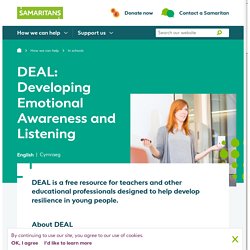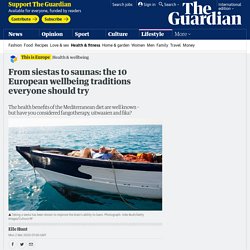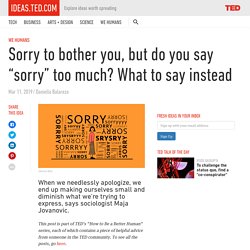

The Scandinavian way to tackle winter - BBC Reel. BBC Reel goes beyond the headlines to see how the Nordic countires are getting their work-life balance correct.

How to hack winter like a SwedeThe idea of 'friluftsliv' is a popular way for people in Nordic countries to keep happy during the wintertime.Now Playing Why the Swedes love paying their taxesSweden has some of the world's highest taxes, so why is the taxman so popular with the Swedes? HumansThe Nordic queen with freedom to roamSweden celebrates the right to roam in the country’s nature, and women embrace the tradition alone.Watch now. DEAL: Developing Emotional Awareness and Listening.
DEAL is a free resource for teachers and other educational professionals designed to help develop resilience in young people.

DEAL includes lesson plans, activities, hand-outs, DEAL digital resources, teachers’ notes and staff training materials can all be accessed and downloaded at any time from Samaritans website. DEAL’s aims DEAL (Developing Emotional Awareness and Listening) aims to: raise awareness of emotional health and the importance of recognising when you need helpdevelop positive coping strategiesreduce stigma and break down barriers around talking about emotional health.developing communication skillsdeveloping supportive and help-seeking behaviour in young people.
What is in the DEAL resources? The DEAL resources contain session plans and activities that are divided into four themes: Want to Be Super Successful? Science Says Do Any 1 of These 10 Things. Six simple mind tricks for dealing with uncertainty - BBC Reel. Work can be stressful, but does that mean happiness at work can't be achieved?

The secrets for managing uncertaintyIs it possible to stay happy when everything around us is so uncertain? Now Playing Is this the end of the office? Will office life ever be the same again? Watch now HealthHow to avoid emotional burnoutHere are some expert tips for avoiding burnout before you're already burn out.Watch now PsychologyThe dangers of idolising the successfulTrying to copy successful people can be ill-fated.Watch now WorkHow to be more efficientA mirage of efficiency that is draining your workdays.Watch now WorkThe value of not having a plan for lifeThere is immense value in not having a concrete plan for your life.Watch now. What other cultures can teach us about forgiveness - BBC Future. Bbc. Fortaleza mental en el deporte: 8 consejos para ser invencible. Making Talent Happen te informa que los datos de carácter personal que me proporciones rellenando el presente formulario serán tratados por Mónica Pascual Herranz (Making Talent Happen) como responsable de esta web.

La finalidad de la recogida y tratamiento de los datos personales que te solicito es para gestionar el alta de registro a mi comunidad. Legitimación: Consentimiento del interesado. Como usuario e interesado te informo que los datos que me facilitas estarán ubicados en los servidores de Active campaign (proveedor de email marketing de Making Talent Happen) fuera de la UE en EEUU. Active campaign está acogido al acuerdo EU-US Privacy Shield, cuya información está disponible aqui, aprobado por el Comité Europeo de Protección de Datos. From siestas to saunas: the 10 European wellbeing traditions everyone should try. Think of “wellness” and you may well think of Gwyneth Paltrow’s brand, Goop: modern, exclusive, quite possibly rubbish.

But a lot of what would fall under that banner dates back centuries and has its roots in Europe, not California. “There is a unique wellness culture in Europe,” says Beth McGroarty, the director of research at the Global Wellness Institute, a US nonprofit group. It dates as far back as Roman spas and the ancient Greek focus on preventing sickness, not merely treating it. “Europe has its own ancient medical thinking and wellness traditions and we don’t seem to pay any attention to them.” The continent is also home to some of the happiest, healthiest countries in the world, although the UK doesn’t trouble the top 10. Spain: the siesta The siesta, a short afternoon nap, is believed to have evolved in Spain to allow farmers time to rest during the hottest hours of the day. What makes strangers click? - BBC Worklife.
Center for Humane Technology. 10 ways to have a better conversation. Greater Good: The Science of a Meaningful Life. Do you say “sorry” too much? What to say instead. Jenice Kim This post is part of TED’s “How to Be a Better Human” series, each of which contains a piece of helpful advice from someone in the TED community.

To see all the posts, go here. Think about all the times you use the word “sorry” in a typical day. There are the necessary “sorry”s — when you bump into someone, when you need to cancel plans with a friend. But what about the unnecessary “sorry”s? Canadian sociologist Maja Jovanovic believes the “sorry”s we sprinkle through our days hurt us. Jovanovic, who teaches at McMaster University and Mohawk College in Hamilton, Ontario, became interested in this topic when she attended a conference four years ago. During the 25 panels at that week-long conference, recalls Jovanovic, “not once did I hear a man take that microphone and discount his accomplishments or minimize his experience.
Jovanovic found the outside world not so different: “Apologies have become our habitual way of communicating,” she says. Approaches to Learning Social Skills.